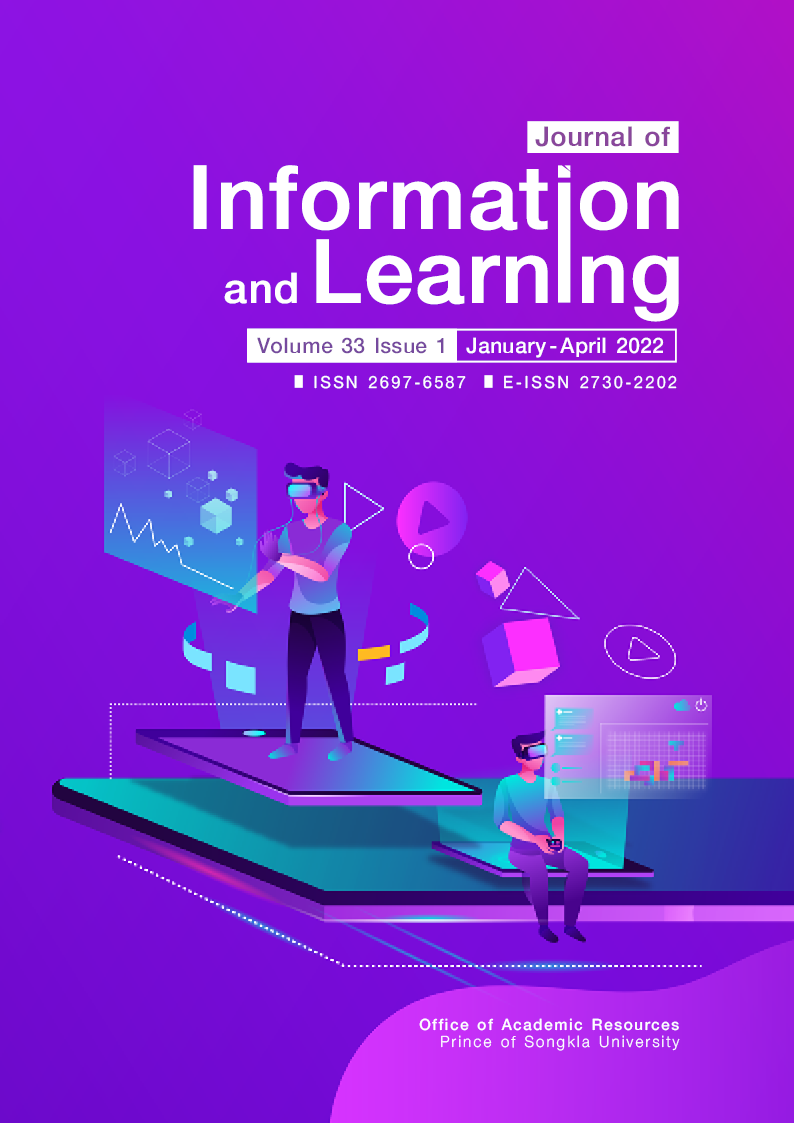Development of Learning Management of European Languages and Cultures in a Multicultural Society: A Case Study of Cross-cultural Communication Course at Prince of Songkla University, Pattani Campus
Main Article Content
Abstract
The purposes of this research were 1) to study the approaches for the development of European language and
cultural learning management, focusing on German and French, in multicultural society, and 2) to study learning outcomes and learners' satisfaction toward learning management in cross-cultural communication course. The sample used in this research were 15 European Languages Program students enrolled in a cross-cultural communication course during the academic years 1/2019, 3/2019 and 1/2020 at Prince of Songkla University, Pattani campus. The research instruments consisted of a learning management plan, group conversation, participant observation, achievement interview, field-based learning tests and satisfaction questionnaire and assessment of learning achievement.
The results of the research showed that 1) guidelines for developing learning management were as follows: 1.1) integrating learning by integrating of dynamic learning styles and a variety of combinations according to learners’ needs, 1.2) organizing extra-curricular activities or extra-field activities for hands-on interactions with native speakers, 1.3) creating a relaxed, equal, fair and democratic learning environment, 1.4) linking the European language to the local environment, 1.5) giving learners an opportunity to transfer knowledge to others, 1.6) developing and applying technology for knowledge transfer, and 1.7) cooperating with organizations and financial support. 2) The learning outcomes were gaining cross-cultural communication skills and understanding of oneself and others in a multicultural society with different religions. The results of the evaluation of the achievement of learning management in all areas were at the highest level in all aspects. The students' satisfaction toward learning management was at a very good level in all three semesters.
Article Details

This work is licensed under a Creative Commons Attribution-NonCommercial-NoDerivatives 4.0 International License.
The Journal of Information and Learning is operated by the Office of Academic Resources, Prince of Songkla University. All articles published in the journal are protected by Thailand copyright law. This copyright covers the exclusive rights to share, reproduce and distribute the article, including in electronic forms, reprints, translations, photographic reproductions, or similar. Authors own copyrights in the works they have created as well as the Office of Academic Resources. The Journal reserves the right to edit the language of papers accepted for publication for clarity and correctness, as well as to make formal changes to ensure compliance with the journal's guidelines. All authors must take public responsibility for the content of their paper.
References
Banks J. A. (1994). Approaches to multicultural curriculum reform. In J. Banks & C. Banks (Eds), Multicultural education: Issues and perspectives (pp. 137-157). Allyn & Bacon.
Banks, J. A. (1988). Multiethnic education: Theory and practice (2nd ed.). Allyn and Bacon.
Banks, J. A. (2004). Introduction: Democratic citizenship education in multicultural societies. In J. A. Banks (Ed.), Diversity and citizenship education: Global perspectives (pp. 3-15). Jossey-Bass.
Banks, J. A., Banks, C. A. Mc Gee (2020). Multicultural education: Issues and perspective (10th ed). John Willy& Sons.
Bolten, J. (2007). Interkulturelle kompetenz. Druckerei Sömmerda GmbH. Cortes, C. E. (1996). Cultural diversity and education: Foundations, curriculum, and teaching (5th ed.). Allyn and Bacon.
Dejamonchai, S. (2013). A study of the state of researches on French teaching and learning in Thailand during the past decade. Humanities Journal, 20(2), 178-202.
Derman-Sparks, L., & Brunson Phillips, C. B. (1997). Teaching/learning antiracism: A developmental Approach. Teachers College Press.
Hollins, E. R. (1999). Relating ethnic and racial identity development to teaching. In R. H. Sheets & E. R. Hollins (Eds.), Racial and ethnic identity in school practices: Aspects of human development (pp. 183-194). Erlbaum.
Luecha, R., Nilayon, N., khotthaphan, W., & Thongprayoon, T. (2019). Guidelines for language and intercultural communication instruction at vocational education in Thailand. Journal of industrial education. Faculty of Education. Srinakharinwirot University, 13(1), 1-23.
Nieto, S. (2000). Affirming diversity: The sociopolitical context of multicultural education (3rd ed). Longman.
Paripanyaporn, K., Pikulkantalers, R., & Bunyamongkolwat, K. (2018). Learning management of German as a foreign language. Journal of Education Studies, 46(4), 523-533.
Seeberg, V., & Minick, T. (2012). Enhancing cross-cultural competence in multicultural teacher education: Transformation in global learning. International Journal of Multicultural Education, 14(3), 1-22.
Shotipongviwat, P. (2017). Analysis of the progressivism philosophy. Faculty of Education: Mahamakut Buddhist University, 5(2), 91-98.Sleeter, C. E. (1991). Empowerment through multicultural Education. State University of New York Press.
Sungtong, E. (2008). Multicultural leadership of public school principals in the Three Southern Border Provinces. Prince of Songkla University.
Thongad, C. (2010). The actual demonstration school: Learning management based on progressive education philosophy. Journal of Education Naresuan University, 12(1), 72-93.
Titus, D. (1998, March 23). Teaching tolerance and appreciation for diversity; applying the research on prejudice reduction [Paper presentation]. The Association of Supervision and Curriculum Development 53rd. Annual Conference and Exhibit Show, San Antonio.
Udomrat, T. (2014). Policies and strategies for the promotion of foreign language instruction in ASEAN+3 countries: A case study of Malaysia. Journal of Education Naresuan University, 16(1), 127-139.
Yongyuan, B., & Padungpong, C. (2007). Using art activities to promote respect for cultural diversity of elementary school students, Pattani province. Songklanakarin Journal of Social Sciences & Humanities, 16(6), 953-972.
Yothakhun, S. (1998). A development of a multicultural education program to promote self understanding of preschool children in the Northeastern region [Master's thesis]. Chulalongkorn University.


